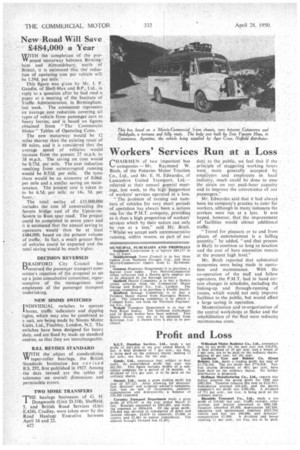Workers' Services Run at a Loss
Page 56

If you've noticed an error in this article please click here to report it so we can fix it.
OHAIRMEN of two important bus
companies — Mr. Raymond W. Birch, of the Potteries Motor Traction Co., Ltd., and Mr. E. H. Edwarcles, of Lancashire United Transport, Ltd.-referred at their annual general meetings, last week, to the high Proportion of workers' services operated at a loss.
"The problem of turning out numbers of vehicles for very short periods of operation has always been a serious one for the P.M.T. company, providing as it does a high proportion of workers' services which by their nature can only be run at a toss," said Mr. Birch. "Whilst we accept such unremunerative running, within reason, as part of our
duty to the public, we feel that if the principle of' staggering working hours were more generally accepted by employers and employees in local industry., much could be done to ease the strain on our peak-hour capacity and to improve the convenience of our passengers."
Mr. Edwardes said that it had always been his company's practice to eater for workers, although in many instances the services were run at a loss. It was hoped, however, that the improvement of facilities would attract additional traffic.
"Travel for pleasure or to and from places of entertainment is a falling quantity," he added, "and that process is likely to continue so long as taxation and the cost of bare necessities remain at the present high level."
Mr. Birch reported that substantial economies were being made in operation and maintenance. With the co-operation of the staff and fellow operators, the P.M.T. had in hand certain changes in schedules, including the linking-up and through-running of routes, which would not only improve facilities to the public, but would effect a .large saving in operation.
Modernization and re-organization of the central workshops at Stoke and the rehabilitation of the fleet were reducing maintenance costs.




































































































































































































